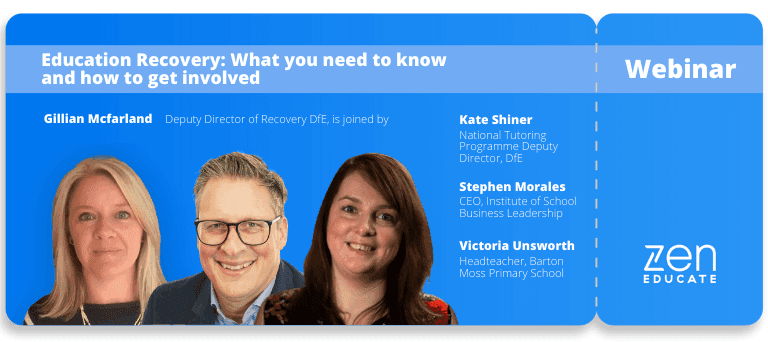Earlier in October, Zen Educate hosted our Education Recovery: what you need to know & how to get involved webinar, looking to answer school leaders’ questions about the Department for Education’s newest education recovery package, how it works and what it means for schools.
Our host for the event, Professor Toby Salt, was joined by an expert panel:
Kate Shiner (Programme Director for the National Tutoring Programme, Department for Education)
Stephen Morales (CEO, Institute of School Business Leadership)
Gillian McFarland (Deputy Director of Recovery, Department for Education)
Victoria Unsworth (Headteacher, Barton Moss Primary School)
Developing best practice in assessment
”We're really proud that those systems that were in place before the pandemic were still in place during the pandemic”.
Victoria Unsworth
Victoria began by contextualising the importance of assessment in and outside of a pandemic:
‘Before the pandemic – and after the pandemic – we never stopped assessing our pupils (...) we planned around the gaps the children had, we taught those things, and then assessed again. The whole cycle of assessment planning, teaching and back into assessment never stopped for our school and our children, because it's all about giving the children a first class education.’
Because a disciplined assessment process was already in place, Victoria detailed how her school has been well equipped in some areas of education recovery:
‘We monitor the progress of our children and lots of our children made the expected progress they would have without the pandemic, so we're really, really proud of that. And the same with attainment, ( …) some of our children 80% of our Year 4s left Year 4 at age-related in maths, which is better than in previous years. So we're really proud that those systems that were in place before the pandemic were still in place during the pandemic. (...) Another aspect of good practice that we are using at the minute is the NELI (Nuffield Early Language Intervention) programme, which is a really fantastic resource, especially for our Early Years children developing their communication and vocabulary.’
As crucial as English and Maths are to pupils’ development, Victoria advised against too much emphasis on core subjects at the expense of other subjects pupils may excel in:
‘Another aspect of our good practice, we are not pulling children out of the afternoon subjects or the non core subjects; we're not pulling children out of music and PE, because some children who struggle academically with English and Maths might excel in Music, in Art, in PE, and our biggest thing is around preparing our children for Key Stage 3, and for future careers.’
Addressing the attainment gap
”We were making important inroads, but we’ve slipped back again.”.
Stephen Morales
Stephen was keen to point out that, in his view, children having a positive overall experience in their education should be the first thing considered:
‘The first thing I would say is that there's an imperative to ensure education continuity. So children having an education experience, before we start worrying about what we see on the PISA (Programme for International Student Assessment) tables, or indeed how we're performing compared to other schools, the important thing is that children have an experience and continue to have a positive experience in schools. And that's before we get into any kind of assessment or worrying about where children were six months ago, or when they might be in three years' time. So I think that in itself is a challenge and will take time.’
Stephen then referenced the significant data pointing toward the increasing attainment gap between less advantaged pupils and their peers:
‘I think the next thing we need to focus on is how we close the attainment gap – and that got bigger over the period of the pandemic. And most significantly, for the most disadvantaged in our system. And you don't have to take my word for it: look at NFER (National Foundation for Education Research) or EPI (Education Policy Institute)’s data on that and you'll see that there's a very concerning move in the wrong direction in terms of that disadvantage. It was always a challenging problem. I think we were making important inroads, but we slipped back again.’
While the money invested by the Department for Education so far for students that qualify for pupil premium has helped address some issues, Stephen spoke about how some school leaders still feel that the funding hasn’t managed to cover everything:
‘Let's not forget that we invest circa £1,000 for every child that's eligible for pupil premium. And of course, that has done enormous things for those disadvantaged children. But there are plenty of school leaders that say we still need more because the very nuanced interventions required to really change the life chances of children with social and emotional needs is really quite significant.’
What the data tells us
”There's clearly a lot more work that needs to be done to understand what the wider impact is across the curriculum”.
Gillian McFarland
Gillian spoke about how DfE data suggests that pupils in England may be further behind than we would like to think:
‘England is a bit of a world leader in terms of the data that we are collecting to help us understand the picture. (...) And we know from the studies that on average, all pupils are a couple of months behind where they would have been if COVID hadn't taken place.’
Although there are indicators within the data of subjects and aspects of subjects that need extra emphasis to better assist catch up, more time is needed to be able to infer what this means for the curriculum as a whole:
‘This also links to pre-pandemic differential impacts on attainment. So we are seeing that disadvantaged pupils have a further journey to travel in terms of catch-up, and we're also seeing things such as pupils who have English as an additional language, particularly in primary settings, again fall that little bit further behind in reading. And then differential across the subjects, we are seeing that Mathematics is a bit further behind reading. And of course, you know, you've heard me mention reading and Maths, that's obviously just one subject and one portion of a subject. There's clearly a lot more work that needs to be done to understand what the wider impact is across the curriculum.’
Luckily, more clarity is expected to be on its way, with new data set to be published by the DfE:
‘In the coming months, we'll also be looking to publish more research including a much clearer and much deeper analysis of what we know from the Spring 2021 data. And then also, emerging findings from data that was collected in the Summer 2021 term. We're also hoping to continue this research as we go along. So that's a summary of what we know.’
NTP’s Approved Tuition Partners
”It is worth saying that the majority of companies and charities that applied this time did not get through!”.
Kate Shiner
Kate addressed attendee questions around the NTP, explaining that tutors provided through the NTP’s Approved Tuition Partners programme have all undergone a stringent approval process:
‘From this September ‘21, based on the lessons learned from the first year of the programme, there are now three routes to access tutoring. (...) The first route is through the National Tutoring Programme’s Approved Tuition Partners, which is an expansion of the offer from last year. So all schools can access subsidised tutoring from an approved list of tutoring providers. They're known as Tuition Partners, and they have been through quality safeguarding evaluation standards through the application process. (...) It is worth saying that the majority of companies and charities that applied this time did not get through!’
‘Like last year, they offer a range of subjects, they provide targeted support for one-to-one or more group tutoring, and they provide additional tutoring capacity to schools, which where that is scarce, is a really important provision.’
However, there is a slight change from last year in subsidy:
‘In terms of funding, 70% of the cost this year is subsidised from the National Tutoring Programme, so 30% will need to be found through the school’s budget, more likely through the recovery premium or or through pupil premium. To sign up for this go to the NTP website to register your interest and to link up with a tuition partner.’
Have any further questions about the DfE’s education recovery programme? Click here to arrange a free consultation with one of our funding specialists.
Follow DfE on Twitter
Follow Kate on Twitter
Follow Victoria on Twitter
Follow Stephen on Twitter
Follow Zen Educate on Twitter
Listen to Zen Educate’s 10 with Zen podcast
We’d like to thank Gillian, Kate, Victoria and Stephen for taking part in this webinar. You can watch the hour long webinar in full below.
Search blog posts …
Search







